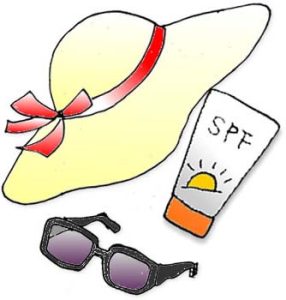Many of you have asked the question “Which sunscreen should I use? “ And I say “Good question.” There are myriad sunscreens out there, how does one decide?
My philosophy is to use a high SPF. Something 50 or higher. Here is my thinking. Remember that SPF (or sun protective factor) is a multiple of how long one can be out in the sun without getting a sunburn when using the sunscreen compared to when not using the sunscreen. Example, if I usually burn in 20 minutes of sun exposure, then when using an SPF of 50 THEORETICALLY I should be able to stay out 20 x 50 or 1000 minutes (or over 16 hours) without burning. This sounds preposterous and indeed it is. No one believes that one could stay out for 16 hours without getting burned. BUT remember these SPFs are assigned in a testing lab under ideal conditions and using generous amounts of sunscreen. It is my belief that the average consumer does not apply sunscreen in the same liberal amount as when the sunscreen was tested in the lab. So let’s say that you apply just half as much as the study did. Now all of a sudden you are down to an SPF of 25!
Now let’s say that you sweat some or that your clothes have rubbed some of the sunscreen off or that the sunscreen “broke down” after it had been on for awhile. Now that SPF 50 has become perhaps a 12 at best. That is why I believe in starting out with a high SPF.
Now when various organizations such as the Environmental Work Group (EWG), for instance evaluate sunscreens they have sharply criticized certain companies for claiming to have SPFs as high as 70 or 100. I can certainly understand this. As we said earlier it is preposterous to make that assumption. But then as I later explained, I do not make this assumption. And I like the “cushion” of having a high SPF to start with knowing that many factors will reduce that efficacy very quickly. Neutrogena was one such company that was severely penalized in the EWG ratings for this very reason. But as long as you understand all of the background I think you can form your own opinion.
As for the presence of possible cancer-causing chemicals in sunscreen, it is naïve to think that there are not chemicals in everything that we apply to our skin. Oxybenzone, a common sunscreen ingredient, has gotten a bad rap because of a rat study where the rats were fed that chemical in a dose which would compare to the dose of a human using it daily for 200 years.
Bottom line: nothing is perfect. No one brand is perfect. But I do know this. Consistent use of sunscreen lowers one’s chances of developing skin cancer and premature aging of the skin. And I practice what I preach.
Margaret Kontras Sutton, M.D.





The concerns about the chemicals in the sunscreen reminds me of the concerns about saccharin as a sugar substitute many years ago, given to lab animals many years ago in amounts that no one could possibly consume. How sad that these studies are still being done and publish, to frighten and confuse the consumer!!
Definitely agree, consistent sunscreen use is the number one thing.
We also recommend SPF 30 and a sunscreen that says “broad spectrum” on the label (our natural mineral sunscreen is an example). Broad spectrum means you’ll get UVB and UVA protection.
We agree! We always recommend Broad Spectrum sunscreen!
when do you apply sunscreen, before or after you apply your moisturizier
Tracy, if you moisturize first, then it will absorb into your skin the best. But as far as sunscreen, you can apply it under or on top of other skin care products and it will still be active.
Oh my god this product is a woendr cream! i recomend this product for anyone suffering with skin imperfections such as acne scaring or an uneven skin tone. when i read that this cream was linked to the same affects as a chemical peel i had my doughts but was amazed at the results. i have suffered with mild acne on my chin since as long as i can remember and have tried everything on the market with unhappy results untill now. i now have new clear skin thanks to this product. it works by shedding the top layer of skin and i use it along with a micro dermabrasion scrub and the affects our amazing it is unlike any other similar products because it doesnt cause your skin to flake instead it balances the skins moisture levels. My skin is no longer dull and blotchy but positively glowing thank you skin doctors! one word of warning though to consumers be carefull of sun beds when using this product it doubles the effect and can harmfully dammage your skin as it breaks down skins natural uv protection always use spf with this product. Always read the product label.